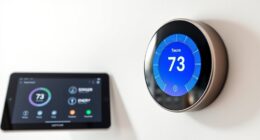Are you fed up with expensive energy bills and ineffective heating? We have the solution for you.
In our article, ‘Boost Heat Pump Energy Efficiency: Expert Techniques Exposed,’ we will delve into the secrets of maximizing your heat pump’s performance.
By understanding heat pump efficiency ratings, optimizing settings, enhancing insulation, and exploring advanced technology, you can save money and stay cozy all winter long.
Don’t miss out on these expert techniques that will revolutionize your energy efficiency.

Key Takeaways
- Higher efficiency ratings indicate better conversion of energy into heat or cool air.
- Factors affecting heat pump efficiency include size, insulation, and outdoor temperature.
- Use a programmable thermostat to regulate temperature settings and create customized schedules.
- Proper insulation reduces heat transfer between indoor and outdoor environments.
Understanding Heat Pump Efficiency Ratings
Let’s dive into understanding heat pump efficiency ratings.
Heat pump efficiency standards play a crucial role in determining the energy efficiency of these systems. The higher the efficiency rating, the more efficient the heat pump is at converting energy into heat or cool air.
The rating is measured using the Seasonal Energy Efficiency Ratio (SEER) and Heating Seasonal Performance Factor (HSPF). SEER measures cooling efficiency, while HSPF measures heating efficiency.
Several factors affect heat pump efficiency, including the size of the heat pump, the insulation of the building, and the outdoor temperature. Proper sizing and installation are essential for optimal efficiency.
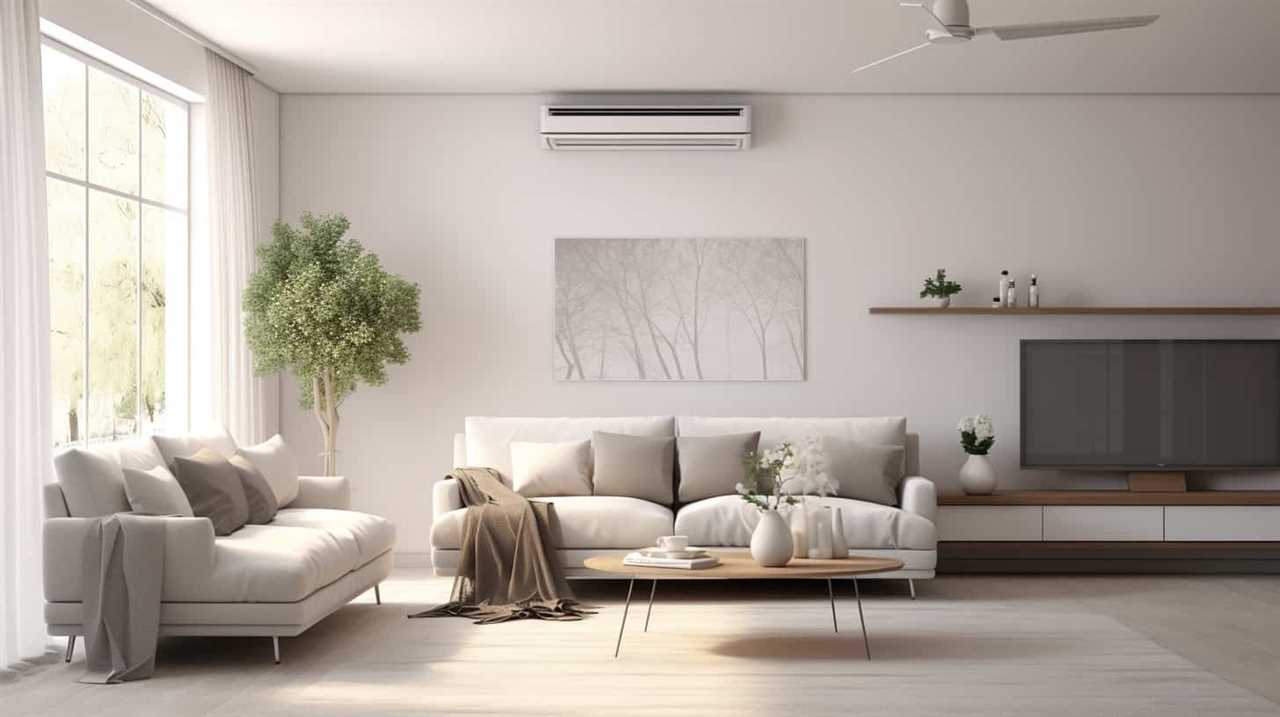
Regular maintenance and cleaning of the heat pump also contribute to its efficiency.
Understanding heat pump efficiency ratings is key to making informed decisions when choosing and maintaining a heat pump system.
Optimizing Heat Pump Settings for Maximum Efficiency
We can optimize heat pump settings for maximum efficiency by adjusting the thermostat and airflow. By implementing the following techniques, we can enhance the performance of our heat pump and reduce energy consumption:
- Install a programmable thermostat to regulate temperature settings and create customized schedules.
- Use the heat pump’s energy-saving mode, if available, to maximize efficiency.
- Regularly clean or replace air filters to ensure proper airflow and prevent system strain.
- Adjust the thermostat temperature incrementally rather than making drastic changes.
- Consider using a smart thermostat that can learn your preferences and adjust settings accordingly.
By implementing these measures, we can effectively maintain our heat pump’s efficiency and minimize energy wastage.
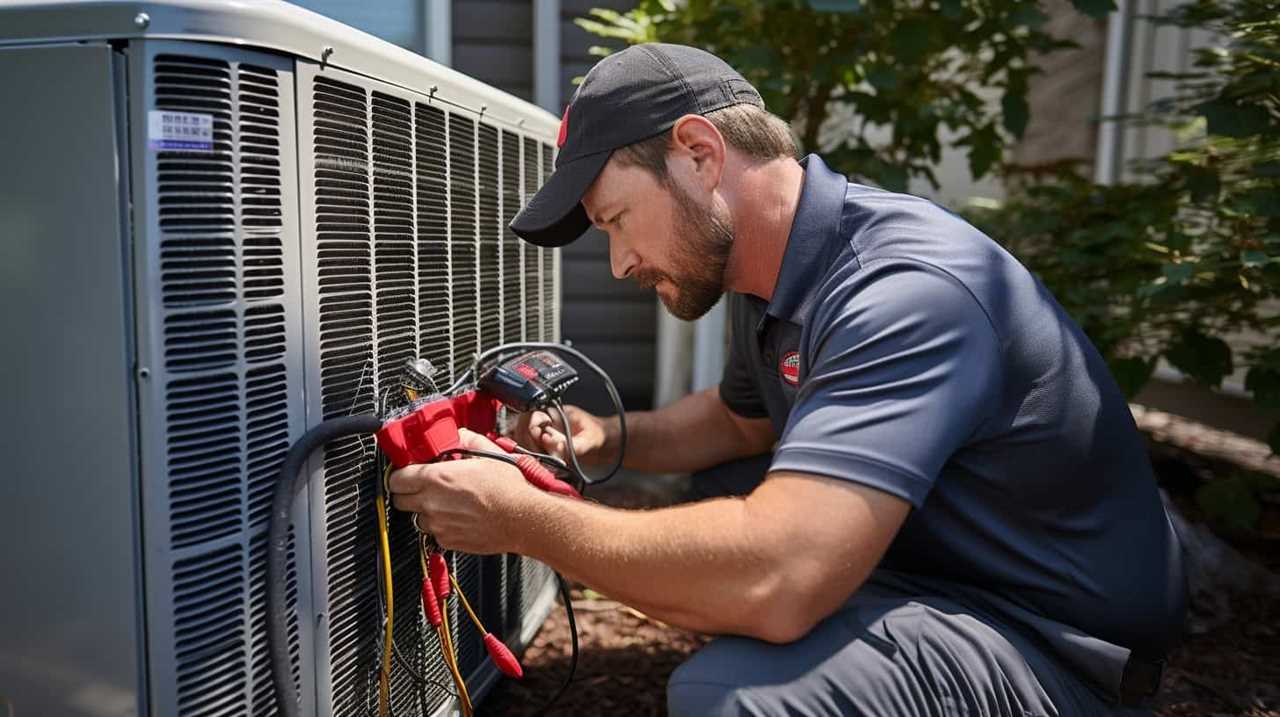
Now, let’s move on to the next section where we’ll explore the importance of enhancing insulation and sealing for optimal heat pump performance.
Enhancing Insulation and Sealing for Heat Pump Performance
Improving insulation and sealing is crucial for optimizing heat pump performance. By implementing effective insulation techniques and air sealing methods, heat loss and air leakage can be minimized, allowing the heat pump to operate at its maximum efficiency.
One of the key insulation techniques is ensuring proper insulation levels in walls, floors, and ceilings. This helps to reduce heat transfer between the indoor and outdoor environments, ensuring that the heat pump doesn’t have to work harder to maintain the desired temperature.
In addition to insulation, air sealing methods play a vital role in heat pump performance. By sealing gaps, cracks, and openings in the building envelope, air infiltration can be minimized, preventing the loss of conditioned air and reducing the strain on the heat pump.
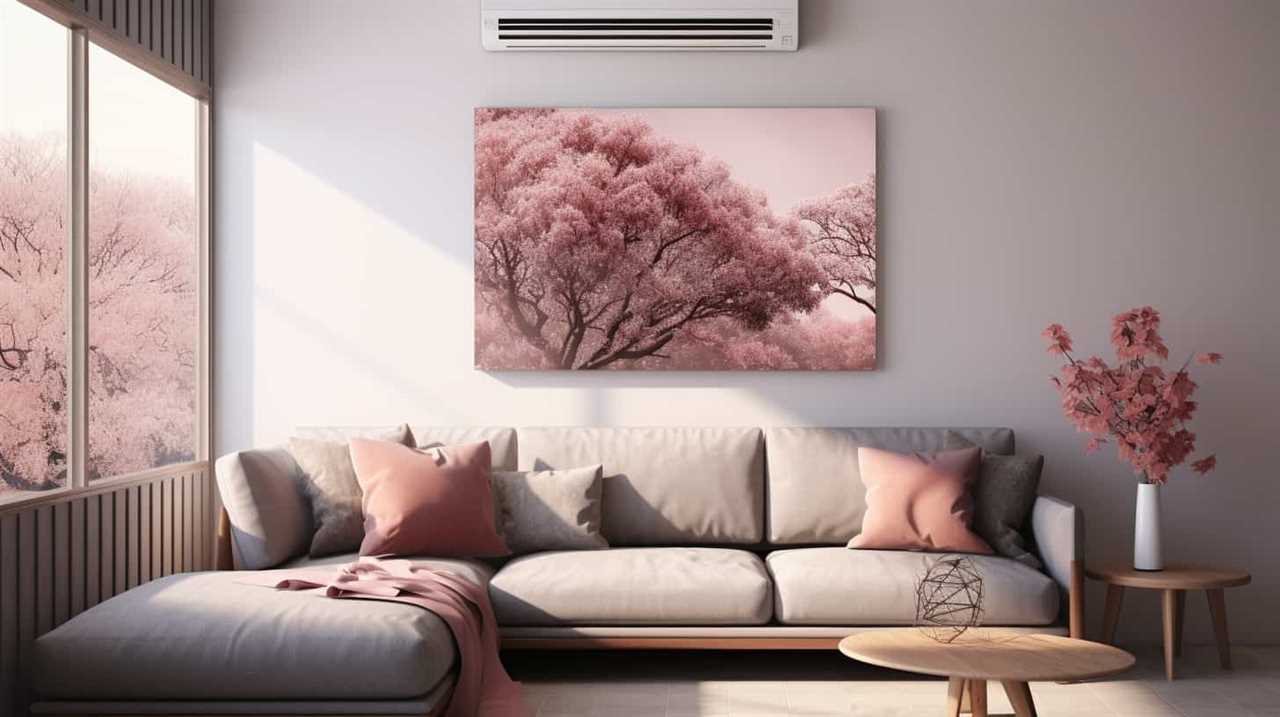
Common air sealing methods include caulking, weatherstripping, and using sealants to seal ductwork. These techniques help to create a more airtight and efficient building envelope, improving comfort and reducing energy consumption.
Regular Maintenance and Tune-ups for Energy Savings
Regular maintenance and tune-ups are essential for maximizing energy savings and prolonging the lifespan of your heat pump. By regularly maintaining your heat pump, you can ensure that it operates at its peak efficiency, reducing energy consumption and lowering your utility bills. Here are five important tasks to include in your maintenance routine:
- Clean or replace air filters regularly to improve airflow and prevent dust and debris buildup.
- Check and clean the outdoor unit to remove any dirt or obstructions that could impede its performance.
- Inspect and tighten electrical connections to ensure safe and efficient operation.
- Lubricate moving parts to reduce friction and minimize energy loss.
- Schedule professional maintenance visits to identify and address any potential issues before they become major problems.
By performing these regular maintenance tasks and investing in energy efficient upgrades, you can greatly reduce the heat pump load and improve its overall efficiency. This will ultimately lead to significant energy savings and a longer lifespan for your heat pump.
In the next section, we’ll explore advanced heat pump technology for even greater efficiency.
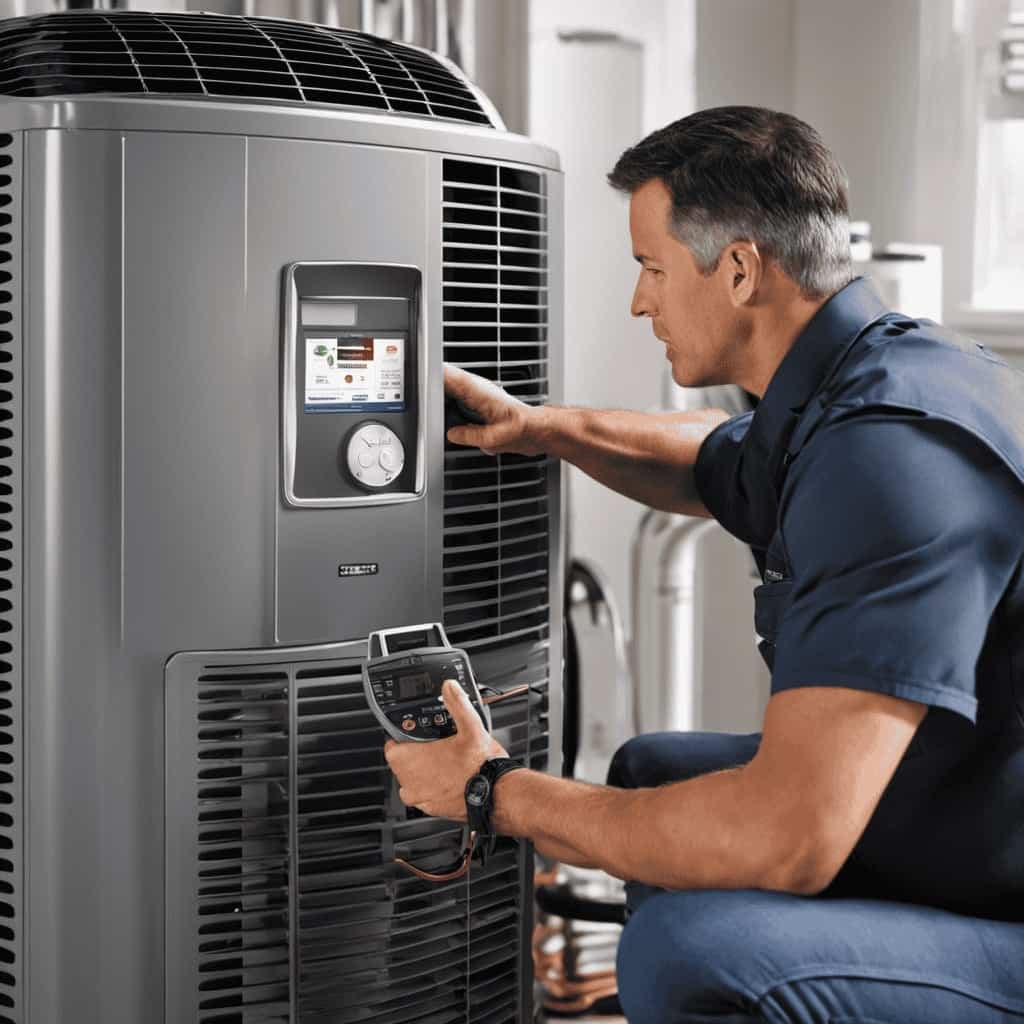
Transition: Now that we’ve discussed the importance of regular maintenance and tune-ups, let’s delve into the realm of exploring advanced heat pump technology for improved efficiency.
Exploring Advanced Heat Pump Technology for Improved Efficiency
Now, let’s explore how advanced heat pump technology can improve efficiency.
Advanced heat pump features and innovative heat pump designs are key to maximizing energy efficiency. One important feature is variable speed compressors, which allow the heat pump to adjust its output based on the heating or cooling load. This results in more precise temperature control and reduced energy consumption.
Another advanced feature is two-stage compressors, which provide increased efficiency by operating at lower speeds for longer periods of time.

Additionally, advanced heat pump designs incorporate improved insulation and reduced air leakage, minimizing heat loss and improving overall system efficiency.
These advancements in heat pump technology not only enhance energy efficiency but also contribute to lower operating costs and increased comfort for homeowners.
Frequently Asked Questions
What Are the Different Types of Heat Pump Efficiency Ratings?
Heat pump efficiency ratings help evaluate heat pump performance. We analyze factors like Seasonal Energy Efficiency Ratio (SEER) and Heating Seasonal Performance Factor (HSPF) to determine how efficiently heat pumps convert energy.
How Can I Determine the Most Suitable Settings for My Heat Pump to Maximize Efficiency?
To maximize efficiency, we determine the most suitable heat pump temperature settings by considering factors such as climate, insulation, and personal comfort preferences. Implementing heat pump energy saving tips can also significantly improve efficiency.

What Are Some Common Areas in a House That Require Insulation and Sealing to Improve Heat Pump Performance?
Insulation techniques and sealing methods are crucial for optimizing heat pump performance. Common areas that require insulation and sealing include windows, doors, attics, and ductwork. These measures enhance energy efficiency and ensure proper heating and cooling throughout the house.
How Often Should I Schedule Maintenance and Tune-Ups for My Heat Pump to Ensure Energy Savings?
We schedule regular maintenance and tune-ups for our heat pump to ensure energy savings. By doing so, we maximize its efficiency and identify any potential issues before they become major problems.
Are There Any New Technological Advancements in Heat Pump Technology That Can Further Improve Energy Efficiency?
Yes, there have been significant advancements in heat pump technology. Smart heat pump technology and energy efficient features have been developed to further improve energy efficiency and reduce operating costs.
Conclusion
In conclusion, optimizing heat pump settings and enhancing insulation are effective techniques to boost energy efficiency.
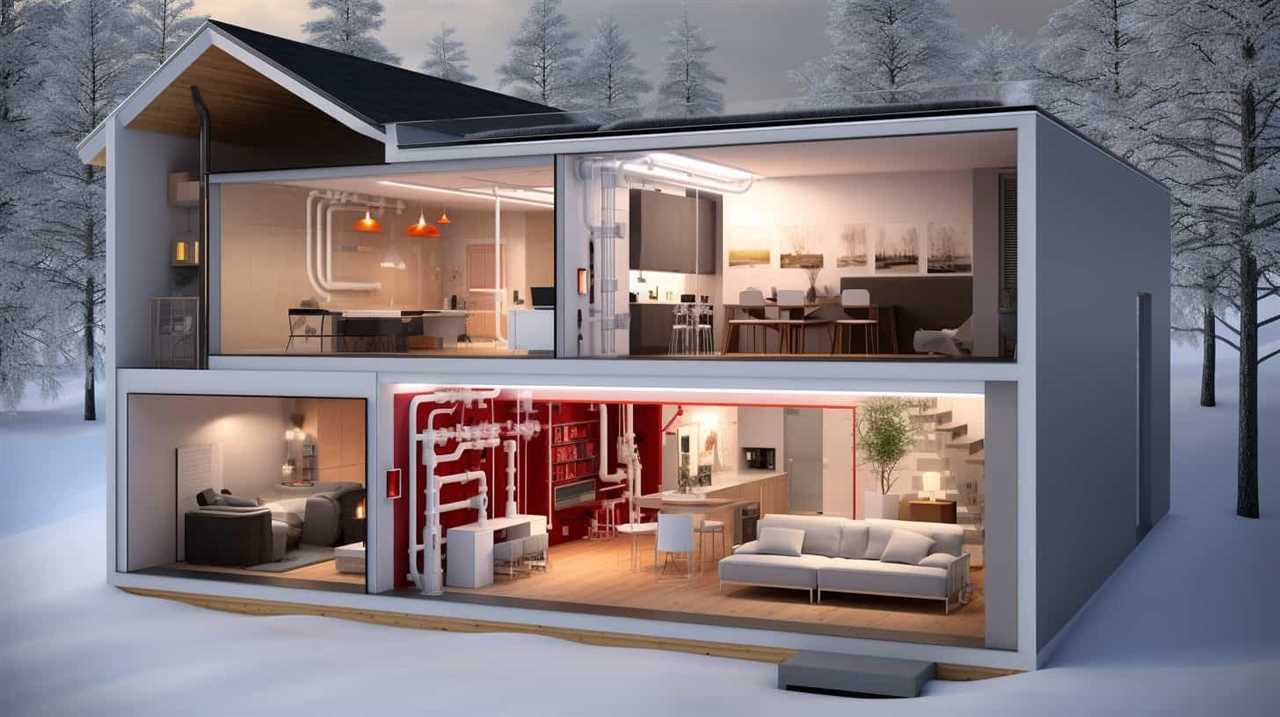
However, regular maintenance and tune-ups are equally important for long-term energy savings. Did you know that a well-maintained heat pump can save up to 20% on heating and cooling costs?
By investing in advanced heat pump technology, homeowners can further improve efficiency and reduce their carbon footprint.
It’s time to take action and make our homes more energy-efficient for a sustainable future.






